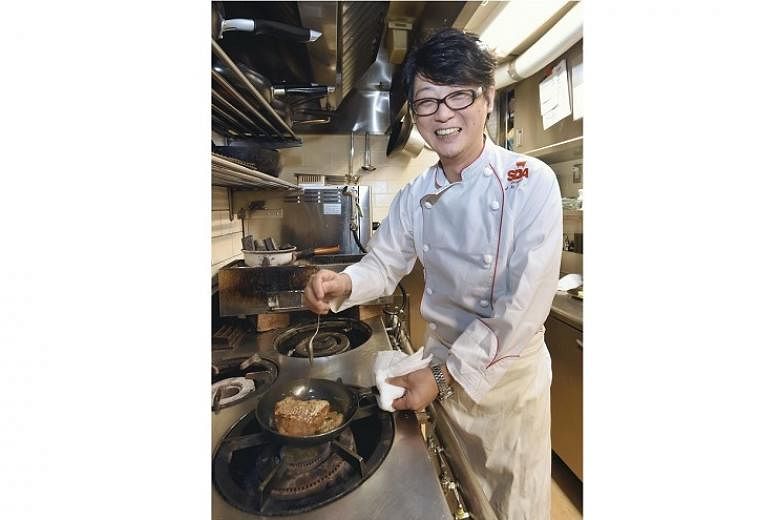(THE YOMIURI SHIMBUN/ASIA NEWS NETWORK) - A number of restaurant menus now feature "dry-aged meat", which is popular for its unique aroma and flavour.
However, no unified standards exist on how to produce such meat, which leads to varying quality.
Carneya Sanoman's, a restaurant in Minato Ward, Tokyo, specialises in dry-aged meat. Hefty cuts are laid out in its large dry-ageing appliance cooled to 0 to 2 deg C.
The restaurant was opened in 2015 by chef Isami Takayama, who trained in Italy. His recommended dish is a thick sirloin steak (3,000 yen or S$36 for 100g), characterised by a crispy surface and juicy, tender flesh. Orders can be made from 200g. "Ageing beef enriches the flavour and improves tenderness," said chef Takayama.
There is no clear definition of dry-aged meat. Generally, the term refers to meat aged longer than normal to enhance flavour among other purposes. It began attracting attention about 10 years ago and can be found today on the menus of many restaurants.
According to Mr Kenji Yamamoto, a consultant on the distribution of agricultural and livestock products, the surge in popularity of matured meat was triggered by the spread of a dry-ageing technique. Dry ageing entails wind-drying the surface of the meat at low temperatures and letting it age for about 40 days.
The method had been used in Europe, but it was in New York that the technique was further advanced. In Japan, meat sales company Sanoman in Fujinomiya, Shizuoka Prefecture, successfully produced dry-aged meat in 2008. Carneya Sanoman's sources its meat from the company.
"In the past, many people favoured marbled beef, but French and Italian chefs began using leaner meat. Dry ageing has become a popular means of enhancing the flavour of leaner cuts," Mr Yamamoto said.
Progress has been made on new methods. Tokyo-based Foodism Co, which conducts business planning for restaurants, and Meiji University successfully made dry-aged meat after about 30 days, after jointly developing "ageing sheets", which are specked with mould spores necessary for the process. Researchers for the project say they can stably produce dry-aged meat without decay.
Fast-food chain operator First Kitchen offers three items on its menu that use the meat, which has been dubbed "fermented dry-aged meat", including the Kuroge Wagyu (black Japanese beef) Burger priced at 1,000 yen, including tax. "Salt and pepper are the only seasonings used, so the aroma of dry-aged meat can be appreciated. We hope customers also enjoy its tender texture," said a public relations official for the company.
Industry lacks clear guidelines
Though dry-aged meat has boomed in popularity, some note its varying quality.
"In the past, some stores sold vacuum-packed meat aged a little longer than usual and tried to pass it off as dry-aged meat," said industry expert Kenji Yamamoto. "Still, some restaurants and stores ask me how to produce dry-aged meat on their own. However, the activities of micro-organisms in a dry-ageing facility determine the quality and it's not easy to produce."
If one simply tries to age meat at home in a refrigerator, it will not mature.
It is currently possible to sell meat of any quality as "dry-aged meat", which may confuse consumers.
To address these circumstances, the Agriculture, Forestry and Fisheries Ministry considered setting standards for dry-aged meat under the Japanese Agricultural Standard (JAS) system in fiscal 2015.
However, there are no established procedures for the preparation of dry-aged meat and a dearth of relevant data. For example, it is unclear how much the flavour should change.
With that in mind, the ministry postponed the creation of standards. It is now conducting relevant studies, on factors such as the flavour properties of aged meat.


